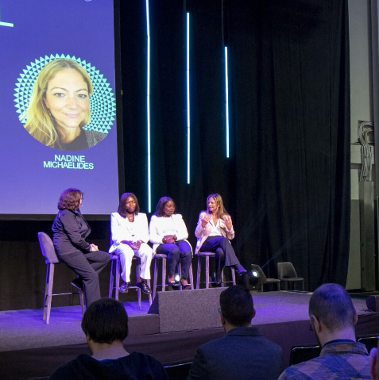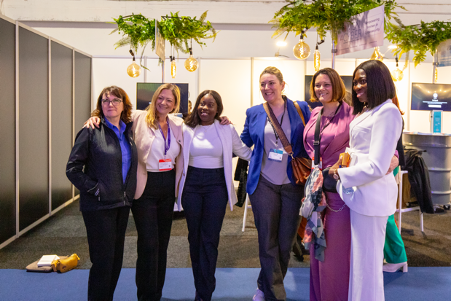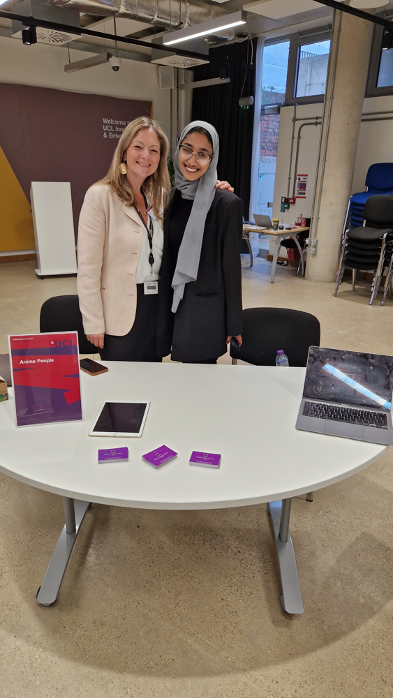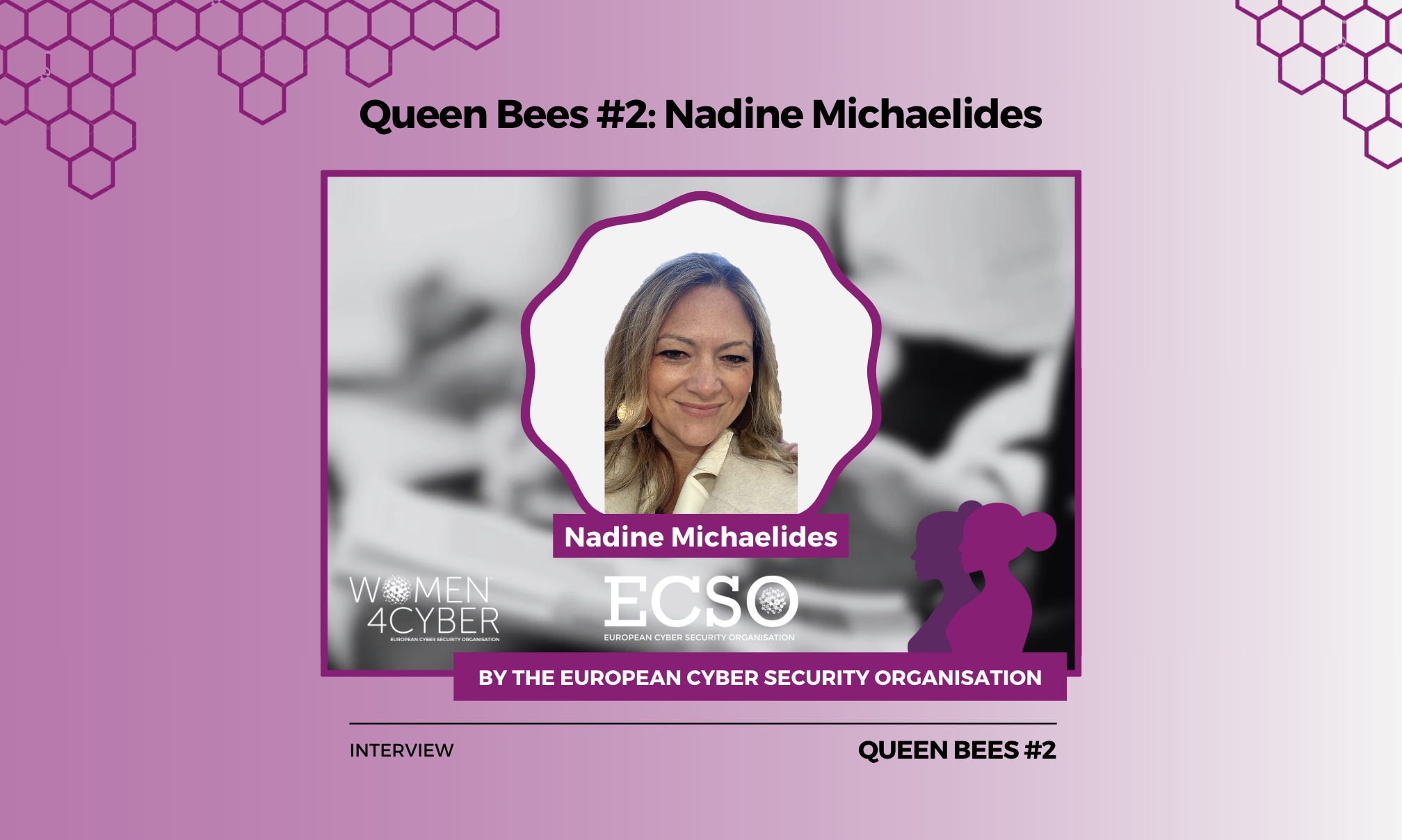Queen Bees is Cyberhive's interview series that regularly shares inspiring career insights from women leading in their cybersecurity hive. We managed to question these busy bees and hope to inspire others with a career in the cybersecurity industry! Do you know an inspiring female leader with an interesting career to share? Contact us at team@thecyberhive.eu!
We interviewed Nadine Michaelides, a Security and Crime Psychologist who has worked with security services, the police, and prison service in the UK, as well as the European Union of Cybersecurity (ENISA). To get where she is now, she had to overcome many hurdles like gender-related stereotypes. Get to know her experiences as woman in the field and get inspired by her lessons!
Could you briefly describe your career path?
I started my career in psychology, but quickly realised that clinical psychology wasn’t the right fit for me and went to work in the psychology department of the Prison Service in the UK, a challenging but exciting experience. I interviewed prisoners and assessed whether they were suitable for psychological interventions as part of their rehabilitation programme.
I then decided to go on a different journey and used my psychological skills and methodologies to deal with behaviour change in the healthcare industry. I was responsible for stakeholder engagement, communications, and marketing; trying to bring patients and employees on a journey to embrace change, whether that be digital transformation or consolidation of services. Whatever the transformation was, it was my role to ensure that employees came on the journey and embraced whatever was on the horizon.
I did this for several years and eventually became tired of the challenges I faced. The board members around me were mostly risk-averse men who weren't very open to employees' input or my suggestions. So, in my 30s, I decided to upskill and pursue a master's in investigative journalism at Gothenburg University.
When did you decide to work in Cybersecurity?
At that point, I was involved in a secret cybersecurity investigative journalism project with five international media organisations. The focus was on cybersecurity surveillance and global drug movement. Through this work, I realised that my career methodologies were highly relevant to the human factors challenges in security management.
I noticed that security teams' technical approaches didn't align with my logical solutions based on my experience and study. So, I decided to upskill with another master's in Organisational Psychology, focusing on organisational culture and individuals. This reinforced that psychological methodologies and historical studies were relevant to addressing cybersecurity threats and employee behaviour. I then applied for a PhD at University College London. I wasn't driven by a desire for a long academic career but believed that the necessary interventions required the support of a reputable university and knowledgeable supervisors in human factors and socio-technical security.

Were you already interested in IT security when you were young?
My primary interest has always been in behaviour change and guiding people through change. Those are the key factors that brought my attention to security and cybersecurity. My research in cybersecurity focuses on the psychological aspects, not just how we identify negative behaviour, but also how we recognise positive behaviour and attitudes. My goal is to create a positive cybersecurity culture and build strong defences and resilience within organisations.
What is your experience as a woman in this field?
My experience as a woman in this field is very similar to what I encountered in the healthcare industry. At the board level, I was often the only woman present. Although I always had time on the agenda to speak, I gradually realised that my ideas and contributions were not utilised as much as those of my male counterparts.
This issue persists in the cybersecurity and technology industries. While women's perspectives are valued in discussions and there is a growing focus on socio-technical security, decision-making regarding solutions and interventions still predominantly reflects the choices made by the men in the room.
However, more women are now occupying roles as chief information security officers and leading security teams. This issue is not exclusive to male behaviour; rather, it highlights the need for a more balanced approach to decision-making. Achieving a multidisciplinary approach to security, which incorporates complex elements like human factors, is crucial for building resilience and a robust security culture.

Do you have any role models you aspire?
A role model that I aspire to is my supervisor at the university where I am pursuing a doctorate, Angela Sassi. She is a leading figure in the field of socio-technical security and established the Research Institute for Sociotechnical Cyber Security (RISCS). Her support over the past three to four years has been invaluable to me.
What would you like to change in the world to close the gender gap in cybersecurity?
To close the gender gap in cybersecurity, I aim not only to see more women in leadership roles but also to witness the impact of their presence on sociotechnical security. This involves adopting a more holistic approach to security, incorporating diverse skill sets such as psychology, sociology, and anthropology. Traditionally, women tend to pursue social sciences more than men. By increasing female representation on boards, I hope we can develop a more comprehensive approach to security, placing employees at the core.

Do you have any suggestions for educational pathways to encourage women to pursue careers in cybersecurity research?
My suggestions for educational pathways involve adopting a scientific approach to social sciences and methodology. For example, pursuing a bachelor's degree in psychology while simultaneously developing technical skills, such as learning computer-based languages, is crucial. This combination of socio and technical skills will prepare individuals for their first job and help them become excellent leaders in the field.




Comments
Do you want to leave a comment?
Login or register to proceed
Login Register